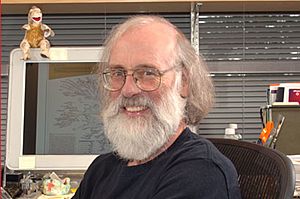Anthony R. Hunter facts for kids
Quick facts for kids
Tony Hunter
|
|
|---|---|

Anthony Rex Hunter
|
|
| Born |
Anthony Rex Hunter
23 August 1943 United Kingdom
|
| Nationality | British |
| Alma mater | |
| Known for | Kinases |
| Awards |
|
| Scientific career | |
| Fields | Biology |
| Institutions | |
| Thesis | Aspects of mammalian protein synthesis (1969) |
| Doctoral advisor | Asher Korner |
| Notable students | Jonathon Pines (postdoc) |
Anthony Rex Hunter, also known as Tony Hunter, is a famous British-American biologist. He was born on August 23, 1943. He works as a professor of biology at the Salk Institute for Biological Studies and the University of California San Diego.
Professor Hunter is a respected member of important science groups. These include the Royal Society in the UK and the National Academy of Sciences in the USA.
Contents
Early Life and Education
Tony Hunter was born in the United Kingdom in 1943. He went to Felsted School when he was younger. Later, he studied at Christ's College, Cambridge.
In 1969, he earned his PhD from Cambridge. His research focused on how protein synthesis works in the body.
Discoveries in Cell Biology
After getting his PhD, Professor Hunter continued his research. He worked at Christ's College, Cambridge and then at the Salk Institute for Biological Studies in California. He became a professor at the Salk Institute in 1982. Since 2008, he has also led the Salk Institute Cancer Center.
Understanding Cell Growth
Professor Hunter is a top expert in how cells grow and control themselves. He studies how cells receive signals that tell them to grow or change.
His most important discovery was about something called "tyrosine phosphorylation." This is a key way cells communicate. It helps cells respond to signals like growth factors.
Cancer Research
Professor Hunter found that if tyrosine phosphorylation goes wrong, it can lead to cancer. This happens when certain proteins, called tyrosine kinases, become overactive. This discovery has been very important for understanding how cancer develops.
His work helps scientists understand how signals inside cells can go wrong. This knowledge is crucial for finding new ways to treat diseases like cancer.
Awards and Honors
Professor Hunter has received many important awards for his scientific work. These awards recognize his major contributions to biology and medicine.
- In 2005, he won the Wolf Prize in Medicine. This was for finding protein kinases that add phosphate to tyrosine. This process is vital for many cell activities, including how cells become cancerous.
- In 2014, he shared the BBVA Foundation Frontiers of Knowledge Award. He received this with Charles Sawyers and Joseph Schlessinger. They were honored for paving the way for new cancer medicines.
List of Major Awards
- 1987: Became a Fellow of the Royal Society (FRS).
- 1994: Received the Charles S. Mott Prize.
- 1994: Awarded the Gairdner Foundation International Award.
- 1998: Became a Member of the US National Academy of Sciences.
- 2001: Won the Keio Medical Science Prize.
- 2004: Received the Louisa Gross Horwitz Prize from Columbia University.
- 2005: Awarded the Wolf Prize in Medicine.
- 2006: Won the Pasarow Award in Cancer Research.
- 2014: Received the Royal Medal.
- 2014: Awarded the BBVA Foundation Frontiers of Knowledge Award in Biomedicine.
- 2017: Won the Sjöberg Prize for Cancer Research.
- 2018: Received the Tang Prize.
- 2018: Awarded the Pezcoller Foundation-AACR International Award for Cancer Research.

